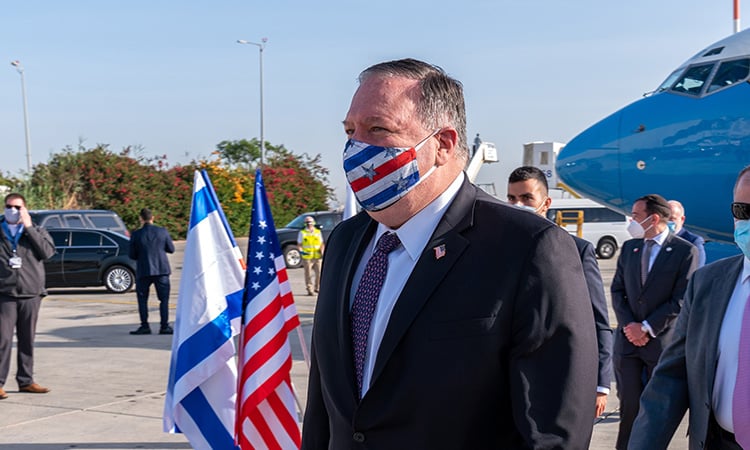
U.S. Secretary of State Mike Pompeo literally dropped into Israel, making his second trip to the region in just under two months amid the tumult of the coronavirus pandemic. The first trip took place at the end of March, when Pompeo arrived unannounced in Kabul to get the Afghanistan resolution off the ground after the U.S. and the Taliban signed an agreement ending their military conflict. Pompeo called this a “special” visit. It took place against a backdrop of disturbing developments concerning COVID-19, which nevertheless didn’t prevent the secretary of state from meeting with Afghan President Ashraf Ghani and his main opponent, Abdullah Abdullah. This is why many experts are linking Pompeo’s visit to Israel with certain “extraordinary events” the parties would prefer to keep quiet. But the secretary of state held separate meetings in Jerusalem with the prime minister and leader of the Likud Party, Benjamin Netanyahu; leader of the Kahol-Lavan Party, Benny Gantz; former Chief of General Staff of the Israel Defense Forces Gabi Ashkenazi, who will also become the Minister of Foreign Affairs in the new Israeli government May 14; and Mossad Director Yossi Cohen.
As often happens in such cases, the most obvious arguments are thrown out the window. Previously, The Jerusalem Post confirmed that one of the main subjects of Pompeo’s negotiations in Israel would be implementing President Donald Trump’s peace plan, which provides for Israel to annex the West Bank of Jordan and the Jordan Valley. But a senior State Department official disavowed this report. “I do think we should dispel the notion that we flew halfway around the world to talk about annexation. That’s been reported…incorrectly,” said the American diplomat. “This wasn’t the top line.” Then what was? As he opened negotiations in Jerusalem, Pompeo outlined the goal of the visit himself: coordinating the “countering [of] two critical threats: COVID-19 and Iran.” He thanked Israel for sharing all of the information it has about COVID-19 with the U.S., “unlike some other countries that try and obfuscate and hide that information.” This was a clear reference to China, even though Pompeo did not explicitly name the country.
But is this the only reason why the top U.S. diplomat flew to Israel? Clearly, certain detailed plans of action were discussed, both at the bilateral level and for purposes of coordination in the Middle East. In a newspaper interview that was conducted just before he left for Israel, Pompeo said that he would be “giving Netanyahu and Gantz advice that will be hard for them to refuse.”* The fact of the matter is that the quarantine period and the “corona ceasefire” in the Palestine-Israel conflict still remain in place, which should prompt reflection. Truth be told, nobody wants to return to old habits right now by firing up and provoking conflict, the victims of which can no longer be blamed on a disease that has been brought in from the outside. As a result, a wide variety of political and diplomatic solutions are being put forward. The telltale signs have appeared – a readiness to trade prisoners of war or reach agreement on the candidate for the new Iraqi prime minister, someone Washington and Tehran can negotiate with on a bilateral level.
It’s true that there is also unconfirmed evidence Iran is reducing its presence in Syria. Objectively, this might change Netanyahu’s position on the formation of an Iranian front in Syria; that is, of course, if Tehran really is going to withdraw its Quds Force from their headquarters in Damascus International Airport or close down its security centers, which have been used to strengthen Hezbollah and other Shiite organizations in Syria and Lebanon. It’s clear that Russia will inevitably become involved in such processes. As Haaretz reports, “[Russia] is getting the chance to strengthen its position in the Middle East not at Israel’s expense, but rather with its participation.” In so doing, Moscow can play the role of mediator between Israel and Iran. Alternatively, according to the French publication JForum, “Israel’s interests are not being covered in a future agreement to strengthen stability in Syria.” In addition to this, it’s possible that the Syrian resolution will drift toward U.N.-sponsored negotiations in Geneva rather than toward an Astana process in which only Russia, Iran and Turkey will participate.
There is a theory that Moscow, while seeking to get Washington to agree to have President Bashar Assad take part in future elections in Syria, could initiate a dialogue between Israel and Syria to somehow get around the Iran issue. It should be noted that the proposed scheme is far-fetched, but the very course of events in the region during the coronavirus pandemic suggests the possibility of certain changes in the Middle East policies of the U.S., Israel, Russia and Iran. Therefore, it’s highly likely that Pompeo was discussing one of the working scenarios for joint further action in the Middle East in Israel to advance some kind of agreement, which, incidentally, might also be connected to the withdrawal of American troops from Syria in coordination with Moscow and Israel. Only in this scenario or something similar would a trip by the top U.S. diplomat be worth the risk in the current situation.
Israel is potentially becoming a platform for dialogue on strengthening stability in Syria. What matters now is how and when the new Israeli coalition government will deliver its plans for action. Israeli experts say that “now there is both more certainty and a greater sense of urgency,” which has appeared in relation to Pompeo’s visit. We’ll just have to wait and see.
*Editor’s Note: Although accurately translated, this quoted remark could not be independently verified.

Leave a Reply
You must be logged in to post a comment.